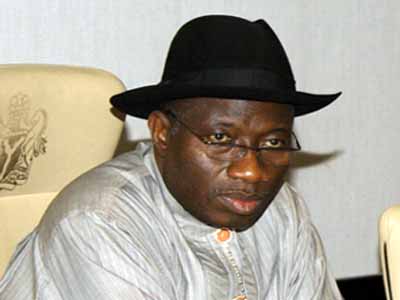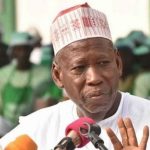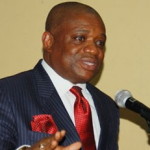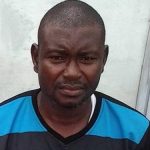Opinion: There was a President of Nigeria called Jonathan
Articles/Opinion, Featured Contributors/Columnists, Latest Headlines Saturday, May 2nd, 2015
By Muhammad Ajah – President Goodluck Ebele Jonathan, GCFR, would have made history when he hands over power to the President-Elect of Nigeria, General Muhammadu Buhari, GCFR, on 29th May, 2015 according to the nation’s constitution, not on 28th May, 2015. Whatever people may say and however these episodes of the general elections may have been sad for some politicians and joyful for others, a history has been made for posterity in Nigeria. Our politicians may learn a lesson.
But in terms of greatness, little more time is required so that Nigerians can begin to compare facts and figures especially after volumes of book would have been written and presented for public perusal by his “sycophantic” loyalists, ministers and political hangers-on.
President Jonathan was really goodluck as his political profile steadily grew without any or much sweat. From Otueke – which I first visited for investigation when his house was bombed on May 16, 2007 shortly after his nomination as Vice Presidential candidate of the then ruling Peoples Democratic Party (PDP) to run with late President Umar Musa Yar’Adua – he has been the luckiest President of Nigeria. He was single handedly picked by the then President, Chief Olusegun Obasanjo, amidst very serious contention by Nigerians and open rivalry by his own ethnic minority, the Ijaw. Obasanjo frustrated popular contenders such as former Rivers state governor, Dr. Peter Odili (popularly called Mr. Donatus because of his generosity while as a governor), full-time philanthropist and nationalist and now executive governor of Imo state, Chief Rochas Okorocha, amongst others. How Odili was depressed by even his supposed godfather Obasanjo for Jonathan!
That was the greater luck for President Jonathan when Chief Obasanjo ignored all popular views and aspirants for Jonathan. Probably, though not enough convincing proofs have been propounded by Obasanjo for choosing Jonathan then, Jonathan was from a minority ethnic group which occupies part of the areas where the nation’s oil and gas are explored. Maybe he wanted to compensate the Ijaw on their war on the nation’s interests at the heat of militancy during his regime. But yes, Obasanjo may have believed that Odili was too ambitious and could become disloyal in the shortest moment after being made the President of Nigeria. O, remember that by that time the declaration of a politician for any contestable position in Nigeria was a predetermined victory! Obasanjo has openly dramatized his regrets for that singular action against the nation. O, remember that elections were a do or die affair as persistently impressed by the PDP under its past leaders! And remember that the performances of the nation’s electoral umpire the Independent National Electoral Commission (INEC) were blurred by incompetence and irregularities.
Another goodluck for President Jonathan was when the same former President masterminded the forceful removal of the then Jonathan’s boss, former Governor of Bayelsa state, Chief Diepreye Alamieseigha and forced Jonathan on Bayelsa people as a governor. Remember that one of the national dailies caught Jonathan in a photo snap when he, himself, was pulling off the portrait of Alamieseigha from the government house where it was hung. Thus he rose to the position of a governor without sweat, riding fully on the wings of Obasanjo, just as it was as he rose to the position of vice president of Nigeria in 2007.
As always a goodluck person, President Jonathan was reported to have been made not too comfortable while in the Presidential villa as the vice president. Reports showed that money was not flowing his way as needed and so some governors, especially one from a Niger Delta state – not Bayelsa or Akwa Ibom by then, took the pains in supporting and consoling him. And until late President Yar’Adua died, the story for him and the then 2nd lady was a mixture of self recognition and hope.
I want to re-quote President Jonathan when he averred on the 2012 democracy day. He said, “We have remained a stable democracy. We have together demonstrated that the government of the people is an ideal that the people of Nigeria cherish. We have our differences as individuals and as politicians, but we have shown great faith in democracy and its institutions. We have refused to be limited by our differences. Despite reservations about some of our institutions, we have refused to submit to despair. This achievement is a testament to the courage and optimism of the Nigerian people”. He continued, “When General Abdusalami Abubakar handed over the baton of authority to President Olusegun Obasanjo, in 1999, it was a turning point for Nigeria. We did not arrive at that turning point by accident. Many Nigerians laid down their lives for the transition to democracy to occur. Some were jailed. Media houses were attacked and shut down. But the people’s
resolve was firm and unshakeable”. These were my recollections in a piece: Jonathan in the eyes of Nigerians.
In my article after the 2011 presidential elections titled “Revelations from the 2011 presidential polls” which was widely published by many print and online news outfits, I was blunt in asserting that the elections exposed the vanity in the religious perfidy and ethnocentric schism between the North and the South which I further analyzed in another article, “Dangers of North/South political dichotomy”. I gave a splendid congratulation to Buhari for shaking the PDP-led government and making it realize that it has to sit up and provide the yearnings of Nigerians, not the party members alone. I was also quick to warn President Goodluck Jonathan to discard all religious acrimony and ethnic antagonism and carry everybody along. But his political appendage, his dear wife – as was referred to by Professor Wole Soyinka – was just impatient, contrary to her name Patience, in creating the enemies and arid atmosphere that swept her dear husband and her powerful self from the Aso Rock villa which they had so much enjoyed and wished not to leave before 2019.
I sympathized with the first family over what they allegedly underwent before they took power on 6th May, 2010. I did not hesitate to caution Nigerians not to hasten in exploring the human being in Jonathan. Yes, there are very similar characteristics that hold mankind together. No human being detests easy life; no human being is one hundred percent a saint or a villain; and though contestable, no human being hates power (being influential and domineering to an extent). The first family may have felt the pains of denied power and influence. The controversies that trailed the swearing-in of President Jonathan as the President on 6th May, 2010 are relevant to authenticate this case. So, like a wounded lion, the first family was out to assert its control of the Nigerian throne, but towed the hard or wrong path.
President Jonathan had the opportunity of making a greater history for himself, for the Nigeria Delta people who have felt neglected and denied of their resources and for the Ijaw ethnic minority group of Nigeria who have been on the forefront on the agitation for resource control due to their perceived government disinterestedness in developing the region. The President had the opportunity of proving his earlier critics wrong by constituting an-all-inclusive government of the Nigerian people and not of the Ijaw nation. Unfortunately, with the sacred burden entrusted on him by Nigerians as he acknowledged – recall my article when he was crowned the Acting President during President Yar’Adua’s sickness – he preferred to form an exclusively Ijaw caucus government.
A paragraph of my article “Acting President: a sacred trust indeed” on February 11, 2010 reads: It may be too early to explore the mankind in the Acting President. Man has remained the same since creation. Sometimes, it is not how long one waits to get something but what becomes of him and how he manages the thing often create circumstances. Again, it is often said that power intoxicates. The situation here is quite unique. Dr. Jonathan’s political profile comes to fore to explain some of the underpins in the whole circle.
However, he may be partly exonerated from the failures of his government. During a call-in programme on one of Abuja based FM stations, a caller pointed out that all or most important decisions from the President were either taken from the kitchen or beer parlour. The caller explained that the kitchen decisions were more domineering as the wife of the President controlled that section. The other decisions were taken while reveling at the beer parlour and by the time the brains were captivated by the black spirit, contract papers and documents – concrete proofs that cannot be reversed – are smuggled before the President for endorsements.
Now that the campaigns are over and the quarrels over how much were expended, the President and his remaining foot soldiers should tread with caution. Whether N2 trillion was squandered or less, the massage is that huge sums of money belonging to Nigerians were given to some few individuals to coarse Nigerians into voting for continuity. But the incoming government is just by the side, waiting to reclaim all monies stolen from the treasury of the nation for personal aggrandizement, and the earlier those involved hasten to vomit their loots, the better. Former President Obasanjo has shown keen interest to expose these people. So the next leadership of the Economic and Final Crimes Commission (EFCC) must be firm and uncompromising. Mallam Nasir el-Rufai is already a governor and I do not know what other serious national assignment Professor Attahiru Jega should be assigned.
President Jonathan has made history for himself. He will be remembered for being the first sitting president to lose power to the opposition, the first president to concede defeat and congratulate his winning opponent, the first president whose loyalists deceived and betrayed so badly and the first president whose wife or who allowed his wife to ruin his political ambition in Nigeria. But he would be more remembered when the handover is successfully performed without hitches on May 29, 2015.
Muhammad Ajah is a writer, author, advocate of humanity and good governance based in Abuja. E-mail mobahawwah@yahoo.co.uk
Related Posts
Short URL: https://www.africanexaminer.com/?p=23398






















